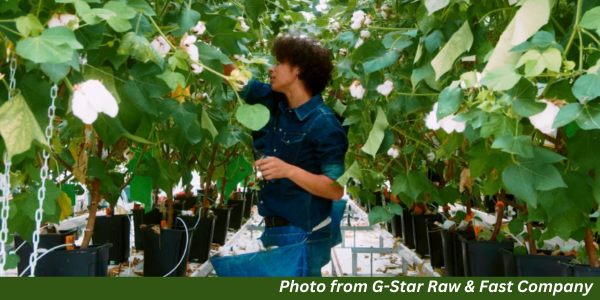
From Fast Company: Someday Your Jeans Could Be Grown In A Greenhouse Down The Street
Fast Company recently featured an interesting story on Dutch denim label G-Star Raw and its partnership with researchers to grow cotton for denim in a greenhouse. It might be the future of fashion. As reported by Elizabeth Segran at Fast Company:
Over the past few years, Patagonia, Citizens of Humanity, and Christy Dawn have started sourcing cotton from farms that use regenerative agriculture methods. But soon, sustainable fashion brands might also consider cotton from another source: a greenhouse. Dutch brand G-Star Raw wants to turn this into a reality.
The brand partnered with a Dutch university on a small pilot project to grow cotton in a greenhouse, then use it to create denim. The end result was five pairs of jeans, made from end-to-end entirely in the Netherlands. Now, G-Star Raw is exploring how to scale this production so that denim brands around the world can create locally made jeans that have a far smaller environmental footprint.
THE LOCAL JEANS CHALLENGE
Cotton grows best in very hot, humid conditions, which is why most of the world’s crops are grown in China, India, Brazil, and the American South. Northern Europe? Not so much.
This presents some complications for European brands like G-Star Raw, a denim brand founded in the Netherlands in 1986. Given the current global supply chain, it must source its cotton from far away, which means shipping cotton long distances, generating extensive carbon emissions. “It also makes traceability more complicated,” says Rebecka Sancho, G-Star’s head of sustainability. “And the first step to sustainability is traceability.” She also points out that new regulations are rolling out in the European Union that demand brands track the entire supply chain of their products.
So it was intriguing to Sancho when Wageningen University, which is globally recognized for its agricultural research, reached out to the brand. Researchers were interested in collaborating on an experiment to see whether it was possible to grow cotton in the Netherlands by using a greenhouse. And they wanted to quantify the environmental footprint of this cotton, as compared to traditionally grown cotton.
carbon emissions, cotton, denim, environmental footprint, research, sustainability